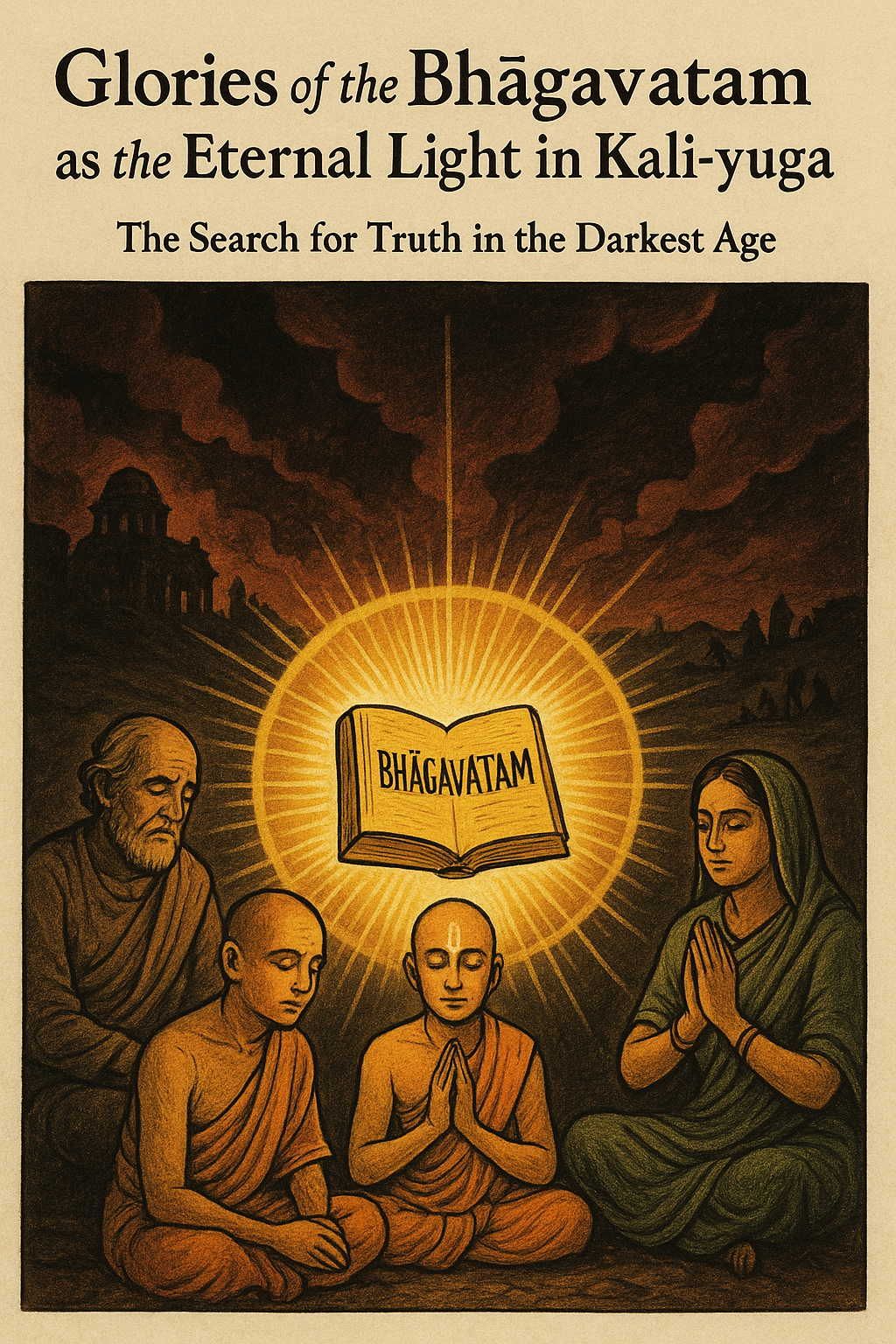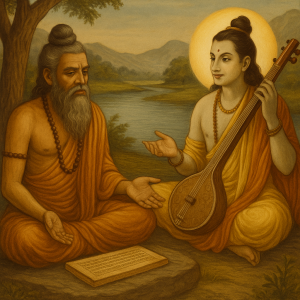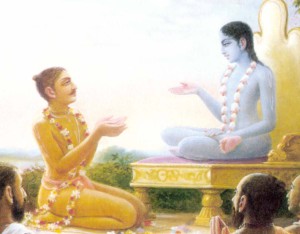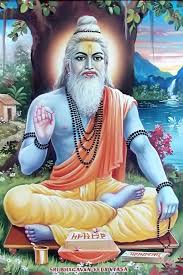The Search for Truth in the Darkest Age
As the age of Kali-yuga spread its shadow across the Earth—marked by quarrel, hypocrisy, and confusion—people lost their connection to dharma, to their own soul, and to the Supreme Lord.
Temples became empty rituals. Scholars debated endlessly but did not love God. The mind became restless, and people turned away from the essence of life.
It was in this dark hour that a light began to shine, brighter than a thousand suns—not from a kingdom or from a sword, but from the Bhāgavata Purāṇa, the spotless Purāṇa, which became the life-breath of all true devotees.
The Birth of the Bhāgavata
When Lord Śrī Kṛṣṇa departed for His eternal abode, dharma in the form of the Lord seemed to vanish from Earth. Seeing the upcoming dangers of Kali-yuga, Śrī Vyāsadeva, the literary incarnation of Bhagavān, felt deep dissatisfaction, despite having compiled all the Vedas, the Mahābhārata, and the eighteen Purāṇas.
His guru, Śrī Nārada Muni, appeared before him and said:
“O Vyāsa, you have written many scriptures, but you have not clearly glorified the Supreme Lord’s pastimes and the path of pure bhakti. Therefore, your heart is not satisfied.”
Vyāsa then sat on the banks of the Sarasvatī in Samyaprāsa and, in samādhi, saw the Supreme Personality of Godhead and the living entities bound in illusion. Out of compassion, he composed the Śrīmad Bhāgavatam, the natural commentary on Vedānta and the mature fruit of the tree of Vedic knowledge.
The Śrīmad Bhāgavatam: The Essence of All Scriptures
The Bhāgavatam is not an ordinary book. It is described as:
- Nigama-kalpa-taror galitaṁ phalam – the ripened fruit of the tree of Vedic literature.
- Śuka-mukhād amṛta-drava-saṁyutam – spoken from the mouth of Śukadeva Gosvāmī, it is filled with nectar.
- Pibata bhāgavataṁ rasam ālayaṁ – one should drink this nectar at every moment.
It contains the pastimes of Lord Kṛṣṇa, the stories of great devotees, and the philosophy of pure devotion beyond ritual, beyond karma, beyond even jñāna.
The Power of the Bhāgavatam in Kali-yuga
In Kali-yuga, people are short-lived, slow to understand, and always disturbed. The only true shelter is:
kṛṣṇa-kathā – hearing about Kṛṣṇa.
And where is this found most purely and abundantly? In the Śrīmad Bhāgavatam.
King Parīkṣit, cursed to die in seven days, gave up his kingdom and fasted on the banks of the Gaṅgā, hearing only Bhāgavatam from Śukadeva Gosvāmī. He attained liberation and love for God.
This example became the standard for Kali-yuga sādhana: not dry renunciation, but rapt attention to the stories of the Lord.
Wherever the Bhāgavatam is read, spoken, sung, or remembered, the Lord personally resides.
The Bhāgavatam in Society
As ages passed, the Bhāgavatam was preserved and spread by pure devotees:
- Śrī Caitanya Mahāprabhu called it the parama-puruṣārtha-grantha, the book that teaches the supreme goal—love of God.
- Gosvāmīs like Jīva and Sanātana taught it in Vṛndāvana.
- Great saints like Śrī Nārāyaṇa Bhaṭṭa and Śrīla Prabhupāda brought it to every village and even every continent.
Wherever there is Bhāgavatam, there is Kṛṣṇa. It is His incarnation in book form.
Lessons to Be Learned:
- The Śrīmad Bhāgavatam is not merely a scripture—it is the very heart of the Lord, accessible to the sincere.
- Hearing Bhāgavatam with faith and love is the greatest sādhana in Kali-yuga.
- The Bhāgavatam awakens bhakti, detachment, joy, and transcendental wisdom in even the most fallen soul.
- Unlike dry logic or debate, the Bhāgavatam melts the heart, inspires service, and nourishes the soul.
As stated in the Bhāgavatam itself:
“Dharmaḥ projjhita-kaitavo ’tra…”
“Herein is completely rejected all cheating religion, and only pure bhakti to Bhagavān is taught.” (1.1.2)
Origin of the Story: Śrīmad Bhāgavatam – Canto 1, Chapters 1–7; Harivaṁśa Purāṇa – Reflections on Kali-yuga and the Bhāgavatam’s role in the age of decline



